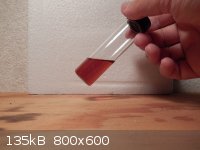thebean
Hazard to Others
  
Posts: 116
Registered: 26-9-2013
Location: Minnesota
Member Is Offline
Mood: Deprotonated
|
|
Aniline Reactions
I picked up some aniline thinking maybe I'd use it to make phenol via the Sandmeyer reaction. I then thought about how I could make phenol with more
convenient methods (thermal decarboxylation of salicylic acid). So I now am sitting with aniline on hand and nothing to do with it. Anyone have any
ideas on interesting reactions? I don't have the most advanced glassware selection but I have access to a fair amount of reagents.
"You need a little bit of insanity to do great things."
-Henry Rollins
|
|
|
plante1999
International Hazard
    
Posts: 1936
Registered: 27-12-2010
Member Is Offline
Mood: Mad as a hatter
|
|
Make dyes, or medicines. Aniline is a starting point for many chemical reactions, especially the two I mentioned. Use it as a base in organic
reaction, to make phosphines or phosphate ester for example.
I never asked for this.
|
|
|
HeYBrO
Hazard to Others
  
Posts: 289
Registered: 6-12-2013
Location: 'straya
Member Is Offline
Mood: 
|
|
There are plenty of reactions using aniline here from the SM library. from page 153 onwards most use aniline. Be careful, as this is an older book so some of the safety considerations are
not the same as today.
|
|
|
ParadoxChem126
Hazard to Others
  
Posts: 104
Registered: 5-4-2013
Location: USA
Member Is Offline
Mood: No Mood
|
|
Prepare phenyldiazonium chloride from the aniline. First, react the aniline with hydrochloric acid. Then, slowly add sodium nitrite solution to the
resulting aniline hydrochloride. Be sure to use the diazonium salt immediately as it decomposes very quickly upon storage.
Phenyldiazonium chloride can be used in the Sandmeyer reaction to prepare a variety of monosubstituted benzene compounds (e.g. chlorobenzene,
bromobenzene, benzonitrile, etc.). Benzene itself can be prepared from the diazonium salt by reduction with sodium stannite. As plante said,
phenyldiazonium chloride can be used in azo coupling reactions to form dyes and medicines. For example, the diazonium salt can be reacted with phenol
dissolved in aqueous sodium hydroxide solution to yield p-hydroxyazobenzene, which dissolves in organic solvents to give an impressive orange color.
Vogel's Textbook of Practical Organic Chemistry describes several diazonium salt reactions. You can find this book in the Sciencemadness library.
Here is a picture of a dilute solution of p-hydroxyazobenzene in acetone.
 
[Edited on 1-3-2014 by ParadoxChem126]
[Edited on 1-3-2014 by ParadoxChem126]
|
|
|
thebean
Hazard to Others
  
Posts: 116
Registered: 26-9-2013
Location: Minnesota
Member Is Offline
Mood: Deprotonated
|
|
Quote: Originally posted by HeYBrO  | | There are plenty of reactions using aniline here from the SM library. from page 153 onwards most use aniline. Be careful, as this is an older book so some of the safety considerations are
not the same as today. |
Thanks, I'm looking forward to doing a lot of this!
"You need a little bit of insanity to do great things."
-Henry Rollins
|
|
|
eidolonicaurum
Hazard to Self
 
Posts: 71
Registered: 2-1-2014
Location: Area 51
Member Is Offline
Mood: Hydric
|
|
I think you can make HNB from aniline, try this thread: http://www.sciencemadness.org/talk/viewthread.php?tid=259
Providing you're mad enough, of course! 
|
|
|